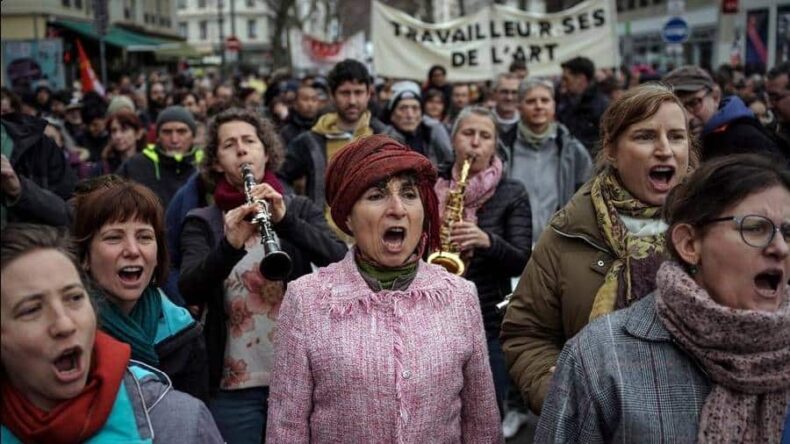Thousands of demonstrators gathered in cities all over France to demonstrate against President Emmanuel Macron’s controversial pension reform plan, which the French Senate has now approved.
By a vote of 195 to 112, senators adopted the changes late on Saturday, moving the bill closer to becoming law and raising the retirement age by two to 64.
Elisabeth Borne, the prime minister, posted on Twitter stating that the Senate ratified the pension reform plan after many hours of debate.
After being approved by the Senate, the bill will now be examined by a joint committee of members of the lower and upper houses of Congress, which is expected to be on Wednesday and will be followed by a predicted final vote in both chambers on the next day. However, in the lower chamber, where President Macron’s party requires allies’ support to win a majority, the result of the vote appears uncertain.
It is still possible for the government to pass the bill without a parliamentary vote using the so-called 49:3 process if it worries that it would not receive sufficient votes in the lower house.
Even though Saturday’s demonstrations against the reform were much fewer than some earlier ones, unions, who have vehemently opposed the reforms, still hoped to persuade Macron to change his mind.
The interior ministry reported that 368,000 protesters marched through different cities on Saturday. After a record 1.28 million people demonstrated in the streets earlier in the week, organizers had anticipated up to a million participants.
On Saturday night, tensions rose, and Paris police reported that they had detained 32 people after some demonstrators threw objects at police officers, leading to trash cans burning and windows being broken.
Claude Jeanvoine, a retired train driver, stated in an interview on Saturday with a media outlet that he was demonstrating on behalf of colleagues and the young population.
The future of their children and grandkids is at stake, said Jeanvoine, 63, who was protesting in Strasbourg. He added that the public shouldn’t allow the authorities to get away with this. The protesters also emphasized how the new change affects women, particularly mothers.
The French unions demanded that the government convene as soon as possible for a “citizens’ consultation” in a rare display of cooperation since the demonstrations began at the end of January.
A second day of national strikes and protests has been scheduled for Wednesday, according to the unions, who promised to maintain the pressure.
According to opinion polls, the majority of voters are against Macron’s plan while a slight percentage are in favor of the strike activities. However, the majority of respondents said they thought the president would succeed in getting the bill passed.
The government maintains that the reform plan is necessary to prevent the French pension system from going broke, but many people believe that the changes, such as increasing the retirement age, are unfair to those who began working when they were younger.
The French economy has been impacted by the unrest and continuous strikes in a number of areas, including train and air transportation, power plants, natural gas terminals, and garbage collection.
TotalEnergies’ French refineries and depots are still experiencing strikes, according to a company representative. Public train operator SNCF stated that national and regional services would continue to be severely disrupted over the weekend.
According to local media, trash is still piling up on the sidewalks of Paris, and locals are noticing an increase in the number of rodents. In accordance with the representative, maintenance was also halted at six French nuclear reactors, including Penly 1.













